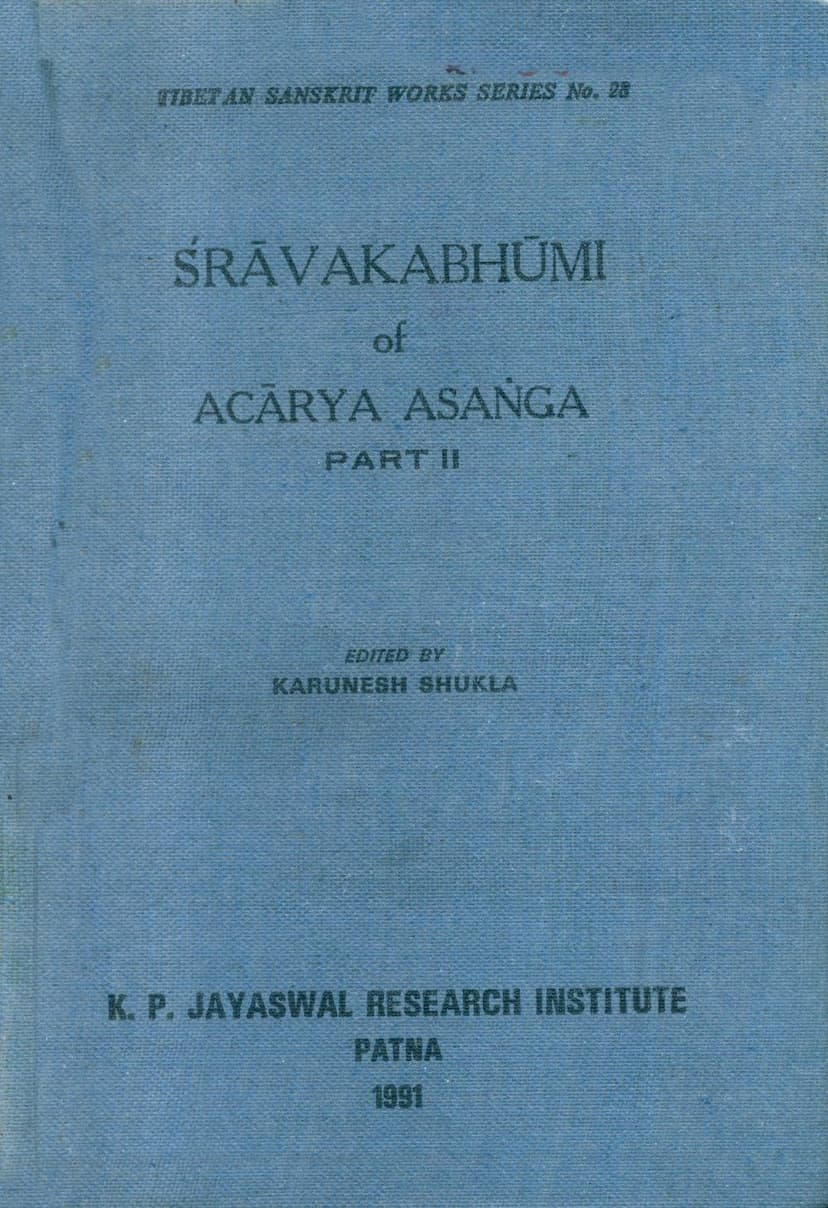Shravak Bhoomi Part 02
Added to library: September 2, 2025

Summary
This document is Part II of the Śrāvaka bhūmi of Ācārya Asaṅga, edited by Karunesh Shukla, and published by the Kashi Prasad Jayaswal Research Institute in Patna in 1991. It is part of the Tibetan Sanskrit Works Series (No. 28).
Here's a breakdown of the key information and content from the provided pages:
Publication Details:
- Title: Śrāvaka bhūmi of Ācārya Asaṅga, Part II
- Author/Editor: Edited by Karunesh Shukla
- Publisher: Kashi Prasad Jayaswal Research Institute, Patna
- Series: Tibetan Sanskrit Works Series No. 28
- Year of Publication: 1991
- Patronage: Published under the patronage of the Government of Bihar.
- Price: Rs. 60/-
- Printing: Printed at Tara Printing Works, Varanasi.
Content of Part II: Part II is a substantial scholarly edition that includes:
-
Introduction: This section is extensive and divided into several parts, covering:
- Beginnings of Buddhist Logic in Asaṅga.
- Importance and review of Asaṅga's works like the Mahāyānaśraddhotpādaśāstra (MSAB), Yogācārabhūmiśāstra (YBS), etc.
- The relationship between the Śrāvaka bhūmi and other bhūmis within the Yogācārabhūmiśāstra.
- A detailed account of the topics discussed in the Śrāvaka bhūmi, linking them to previous Buddhist thinking and Asaṅga's philosophy. Specific topics covered include:
- Gotra (lineage/potential)
- Avatāra (descent/entering the path)
- Naiṣkramya (renunciation)
- Āhāra (nourishment/sustenance)
- Kalyāṇamitratā (virtuous friendship)
- Pratītyasamutpāda (dependent origination)
- Anitya-anātma (impermanence and non-self)
- Aspects of cultural accounts found in Asaṅga's works.
- Language and Style of Asaṅga.
- Quotations and References.
- Details about the present edition: restorations and emendations.
- A short survey of the overall contents.
- An analytic summary of the Śrāvaka bhūmi, detailing its structure (four Yogasthānas and three sub-bhūmis: Gotra, Avatāra, Naiskramya bhūmis) and the specific doctrines discussed within each.
-
Appendices:
- Appendix I: Sanskrit Reconstruction of the Lost Portions of the Text (specifically from the First Yogasthāna: Gotra bhūmi and Avatāra bhūmi), based on Tibetan translations.
- Appendix II: Verses occurring in the Śrāvaka bhūmi.
- Appendix III: Hetuvidyā of Asaṅga (from the Śrutamayī bhūmi).
- Appendix IV: Sanskrit Text of Paramārthāgāthā-vyavasthāna, Abhiprāyikīgāthā-vyavasthāna, and Śarīrārthagāthā-vyavasthāna (these are philosophical sections likely related to the nature of reality and the body).
- Appendix V: Analytical Contents of the Śrāvaka bhūmi, providing a detailed outline of the topics covered in each of the four Yogasthānas.
-
Indices:
- Index I: Quotations
- Index II: Index of Verses
- Index III: Index of Important Sanskrit Words
Key Themes and Contributions:
- Śrāvaka Path: The text focuses on the spiritual career of a śrāvaka (a disciple who hears the Buddha's teachings), specifically from the perspective of a yogin. It outlines the path towards higher stages like pratyekabuddha and bodhisattva, ultimately leading to nirvāṇa.
- Yogācāra Philosophy: It delves into the core doctrines of the Yogācāra school, emphasizing mental cultivation (yoga) and the stages of spiritual progress.
- Buddhist Logic: The introduction highlights Asaṅga's foundational contributions to Buddhist logic, particularly in defining concepts related to debate (vāda) and the principles of reasoning.
- Reconstruction of Lost Texts: A significant aspect of this publication is the reconstruction of lost Sanskrit portions of the Śrāvaka bhūmi from its Tibetan translation, making it accessible to scholars.
- Interconnection of Buddhist Traditions: The work demonstrates how Asaṅga integrated and synthesized ideas from various Buddhist schools, including early Buddhism (Pali canons), Mahāyāna sūtras, and Abhidharma texts, while also showing potential engagement with non-Buddhist Indian philosophical traditions.
- Detailed Analysis of Practices: The text provides an in-depth analysis of various yogic practices, ethical conduct (śīla), sense restraint (indriya saṁvara), mindfulness (smṛti), contemplation (bhāvanā), and the cultivation of virtuous qualities.
In essence, this volume is a critical scholarly edition and a comprehensive study of the Śrāvaka bhūmi, a crucial text for understanding the Yogācāra path and Asaṅga's profound philosophical and practical teachings.